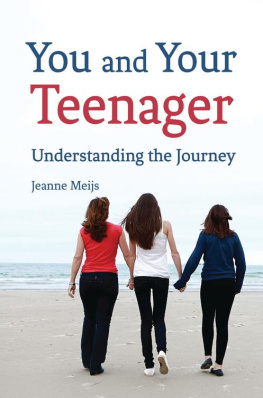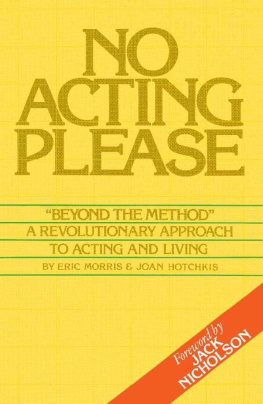HOW TO DEAL WITH
YOUR ACTING-UP TEENAGER
HOW TO DEAL WITH
YOUR ACTING-UP TEENAGER
Practical Self-Help for
Desperate Parents

Robert T. Bayard, Ph.D.
Jean Bayard, Ph.D.


Library of Congress Cataloging in Publication Data
Bayard, Robert Thomas.
How to deal with your acting-up teenager.
Includes index.
1. Parenting--United States. 2. Youth--United States--Attitudes. 3. Conflict of generations. I. Bayard, Jean, 1923 . II. Title.
HQ755.85.B39 1983 649'.125 831414
ISBN 0871314797 PAPERBACK
ISBN 087131407X HARDCOVER
ISBN 978-0-87131-479-6
Copyright 1981, 1983 by Robert T. Bayard and Jean Bayard
All rights reserved. No part of this book may be reproduced in any form or by any electronic or mechanical means, including information storage and retrieval systems, without written permission from the publisher, except by a reviewer who may quote passages in a review.
Published by M. Evans
An imprint of The Rowman & Littlefield Publishing Group, Inc.
4501 Forbes Boulevard, Suite 200, Lanham, Maryland 20706
Distributed by NATIONAL BOOK NETWORK
 The paper used in this publication meets the minimum requirements of American National Standard for Information SciencesPermanence of Paper for Printed Library Materials, ANSI/NISO Z39.48-1992.
The paper used in this publication meets the minimum requirements of American National Standard for Information SciencesPermanence of Paper for Printed Library Materials, ANSI/NISO Z39.48-1992.
Manufactured in the United States of America.
For
our beloved parents
Elsa Holwerda Mary Bayard
Gerhardus Holwerda Thomas Bayard
and children
Dona Sauerburger
David Bayard
Bernard Bayard
Thomas Bayard
Lynda Easley
Appreciations
Contact with some remarkable persons has helped us in developing the ideas behind this book, and in making the book itself. We are grateful:
Especially to the many desperate parents and their kids who worked as clients with us.
To Pat Kaspar, our consulting editor, and to Jane Miller, design consultant.
To Catherine Young, Ph. D., former Chief Psychologist, Western Psychiatric Institute and Clinic, University of Pittsburgh Medical School.
To Al Stratton, Ph. D., former Chief Psychologist, Staunton Clinic, University of Pittsburgh Medical School.
To Helen Mehr, Ph.D., colleague, consultant, and friend.
To Arthur Bodin, Ph. D., Research Associate, Mental Research Institute, Palo Alto.
To Richard Fisch, M.D., Paul Watzlawick, Ph.D. and John Weakland, of the Brief Therapy Group, Mental Research Institute, Palo Alto.
And to our colleagues of the Emergency Treatment Center, Santa Clara:
Diana Everstine, Ph.D., Director
Ellen Bader, Ph. D.
Mike Barraza, M.S.
Ione Binford, M.S.
Carolyn Cameron, M.S.
Fred DAguinaga
Christine Dusek, M.S.
Louis Everstine, Ph.D.
Stephen Fields, Ph.D.
Edith Groner, M.S.W.
Harold Johnson, Ph.D.
Margaret Johnson
Novelle Johnson, M.S.
Ferol Larsen, M. A.
Jay Livingston, Ph.D.
Marcia Porter, Ph.D.
David Rasch, M.S.
Christine Remus, M.A.
Sheri Rosso
Edith Savage
David Fenstermaker, M.S.
Manoucher Tavokoli, Ph.D.
Richard Toft, Ph.D.
Judy Tombrink, M.S.
Matthew Turnbo, M.S.
Eileen Valcov, Ph.D.
Deak Van Arsdale, Ph. D.
Madelyn Witt, M.S.
Contents
Common teenage problems and traditional responses... What you can accomplish with the help of this book... Six reassuring truths behind the parent/teen dilemma... Defining short and long term goals for change
Two sets of problems: those that affect your kids life versus those that upset yours... How to go about giving your kid this responsibility
The good parent fallacy... The trouble with shoulds and should-nots... Letting your teenager make his/her own decisions... What you believe about your kid will come true
The teenagers wish for and fear of freedom... Handling conflict... How not to give in to the demand for negative attention
Getting back in touch with your own wants and needs... Seven exercises to sharpen your response to your inner voice
Getting past the doormat attitude... Your rights and how to claim them... How to overcome fear of encounter
A change of tactics for tough problems: lying, stealing, threats, swearing, a sullen or belligerent attitude, when your kid abuses favors
A five-step campaign... Establishing a fair request for change... Standing firm against pressure... Sample dialogues for specific problems
How to steal center stage from your teenager... Becoming spontaneous... Establishing credibility... The Parental Strike
You and your kid in the future
Preface
If you are feeling worried or troubled about your teenager, we want to extend to you a welcome and to share with you, through this book, a way of easing your load. Do not feel alone, for there are thousands of other parents experiencing much the same problems you are, and the chances are that some of them are very close to younear neighbors and friends. You may not realize you have this much company, because in our society the parent is supposed to feel ashamed when a son or daughter cuts school or gets drunk or otherwise behaves foolishly, and therefore even friends tend not to confide in each other how their kids are really doing and how they, the parents, really feel about it. Your friends, to show a polite interest in you, may still greet you with the question How are the kids? but the appropriate answer is to tell them about the socially-approved things your kids are doing, not about the rebellions, the fights, the late nights, the truancies. To let the negative things become known would somehow mark you a failure as a parent, and the others you know feel the same way about it, so everyone keeps quiet and feels desperate in private.
We, Bob and Jean Bayard, have gone through this kind of experience, and so feel a special kind of interest in the situation of beleaguered parents. To us, its vitally important which of two ways you go in resolving that situation. It will almost certainly look as if the problem originates in something your kid is doing, and as if the solution lies in somehow changing your kid, getting him or her to behave differently; however it will almost as certainly be better handled by seeing it as an opportunity for you to change something about your life, expanding it and learning to take better care of it. In this book we give you our ideas on how to take the second way, for the benefit of you and your kid.
We did not always feel so confident about how to handle these situations as we do now. We have raised five children, and in the process we have done almost every one of the things, either wise or foolish, that we talk about in this book. The kinds of things our children did is their story to tell, and we respect their privacy, so we will say only that we have probably lived through as wide a gamut of kid behavior as any of the parents we have worked with, and our feelings about it colored our lives for many years.









 The paper used in this publication meets the minimum requirements of American National Standard for Information SciencesPermanence of Paper for Printed Library Materials, ANSI/NISO Z39.48-1992.
The paper used in this publication meets the minimum requirements of American National Standard for Information SciencesPermanence of Paper for Printed Library Materials, ANSI/NISO Z39.48-1992.